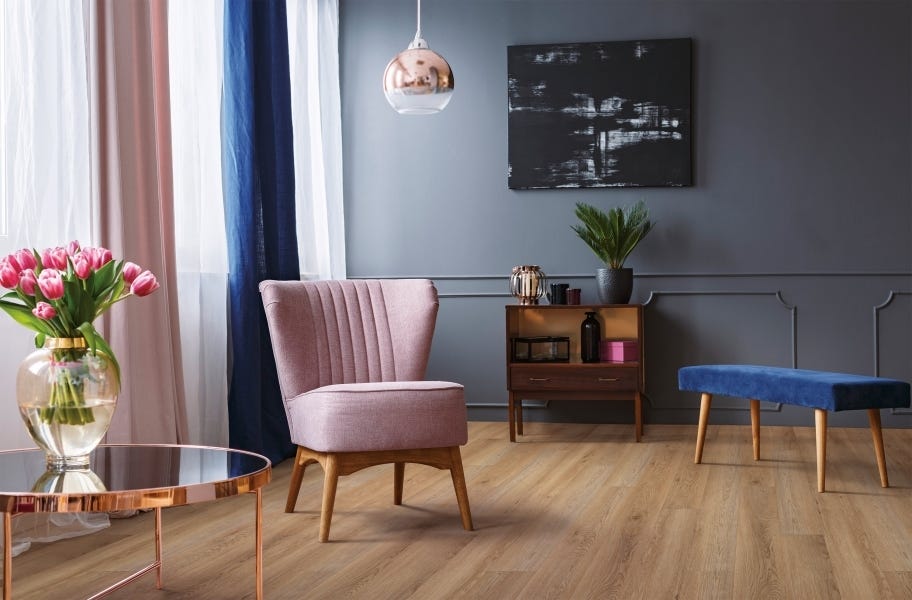
Lots of people are ripping up their carpets and putting down luxury vinyl planks for a lovely wood look in their homes. However, with all the information out there, vinyl plank flooring can be a confusing subject.
To help you shop, we’ve compiled the best information we have on vinyl planks. That way you can make an informed decision.
In this guide, you’ll learn about the different types of vinyl planks, thickness and wear layer options, style options, and even how to install vinyl planks.
Let’s get started!
What is Vinyl Plank Flooring?
All vinyl plank flooring is made in part from PVC, which is a type of durable plastic. Beyond that, there are several types of vinyl plank flooring. You have a lot of options, including peel and stick vinyl planks, rigid core, luxury vinyl planks, and even waterproof vinyl planks.
These all share the benefits of vinyl, but they are composed of varying amounts of layers and features.
Before we go into detail with each type of plank, here are some important factors that all vinyl plank flooring has in common.
| Related Content >> Vinyl Flooring Installation Cost Guide |
Vinyl Plank Flooring Thickness
In the past, a thicker vinyl plank typically meant a sturdier floor. A thicker plank was often denser and more substantial beneath your feet.
However, with the introduction of stone-plastic composite (SPC) vinyl plank flooring, all of that changed. SPC vinyl planks are ultra-thin and incredibly durable. This is because the core is made from a dense stone-plastic composite that resists denting and covers up imperfections in the subfloor.
These days, when you’re considering the thickness of a plank, the most important thing to keep in mind is whether the height allows you to “match up” to your other floors without too much transition
Vinyl Plank Flooring Wear Layer
The wear layer is a durable coating on the top layer of your floor that protects the flooring surface. It helps to withstand scuffs, dents, scrapes, and stains.
If you’re using vinyl planks for a low-traffic area, you might not need the thickest wear layer. However, if your vinyl flooring will be in the midst of your rough and tumble life, then thicker is better.
Wear Layer Ratings:
- 6 mil (Good): Residential use.
- 12 mil (Better): Residential – light commercial.
- 20 mil+ (Best): Commercially rated. High traffic environments.
| Related Content >> Vinyl Plank Flooring Pros and Cons |
Commercial vs. Residential Vinyl Plank Flooring

Wherever you want to install some new flooring, luxury vinyl planks are designed to meet your needs. We offer durable yet comfortable WPC vinyl planks perfect for residential spaces, as well as commercial-grade rigid core SPC vinyl planks.
- Residential vinyl planks: All of our luxury vinyl planks are sturdy enough to succeed in your home, whether you choose peel-and-stick, glue-down, or interlocking planks. As long as you purchase your flooring with a substantial wear layer, you can rest easy knowing your floor will resist years of wear and tear.
- Commercial LVP: Wood-plastic composite (WPC) and SPC vinyl excel in commercial spaces because they’re durable and waterproof. Make sure you buy an ultra-thick wear layer, and your flooring will be virtually indestructible.
Types of Vinyl Plank Flooring
There are three main categories of vinyl plank flooring: luxury vinyl planks (LVP), wood-plastic composite vinyl planks (WPC), and stone-plastic composite vinyl planks (SPC). They might all look the same at first glance, but there are some important differences that you should know about.
Luxury Vinyl Planks
LVP flooring stands for luxury vinyl planks.
These planks typically have a rigid construction and they’re made to be very durable. They’re typically higher quality than the peel and stick variety, but nowadays, there are even a few peel and stick options that are considered luxury!
It’s worth noting that there isn’t a defined industry standard for the word “luxury.” Usually, though, a luxury vinyl product includes a thick, durable floor, multiple layers, a realistic image, and a tough wear layer. If not, then it might not be as high quality as it claims.
Our luxury vinyl planks can stand up to the abuse of high traffic, kids, and pets. They feature highly realistic wood, stone, and decorative visuals. Plus, they’re designed for quick and easy installation.
| Related Content >> Waterproof Vinyl Flooring Buying Guide |
WPC Waterproof Vinyl Planks
Waterproof vinyl flooring (also known as WPC vinyl flooring) is luxury vinyl that is 100% waterproof.
WPC vinyl flooring typically features a four-layer construction that includes a waterproof core made from a mixture of wood and plastic. This core is what sets this luxury vinyl apart from the rest. It’s durable, yet resilient enough to provide a bit of give underfoot, making it perfect for busy homes.
Waterproof vinyl planks can be installed anywhere. They’re typically thick enough to be installed over imperfect subfloors and can be installed in basements, kitchens, living rooms, and more.
SPC Rigid Core Vinyl Planks
Rigid core vinyl planks (also known as SPC vinyl flooring) are also 100% waterproof.
At this point, you might be wondering what the difference is between SPC rigid core and WPC waterproof core. The answer lies in the different cores.
Rigid core luxury vinyl flooring has a stone-plastic composite core. That means its core is super dense and practically indestructible. It’s tough stuff.
Because rigid core vinyl is so tough, it’s perfect for high-traffic areas and commercial buildings. It’s certified to handle commercial areas. Because of the ultra-dense core, it’s not likely to dent under heavy furniture. However, it doesn’t provide as much warmth or softness as WPC.
| Related Content >> SPC vs. WPC Waterproof Vinyl Flooring |
Styles of Vinyl Planks
Now that you know all the important technical considerations, it’s time for the fun part – style! You’re probably interested in what vinyl plank flooring looks like. The style of your floor is what brings your whole space together, so you don’t want to skimp on quality.
The good news is, this flooring is incredibly beautiful and versatile. You can find classic wood-look or stone-look patterns, or get trendy with the latest decorative looks. The options are virtually limitless.
Wood-Look Vinyl Planks
Wood-look vinyl planks are by far the most popular style. Everyone wants the look of hardwood flooring, without having to deal with the finicky nature of real wood.
Best yet, we have wood-look flooring that hits all the modern trends. Do you want gray floors? We have that. Do you want textured floors? We have that too. Plus, we offer a huge selection of shades, from light blondes to rich, dark tones.
Wood-look vinyl planks come in all the colors and finishes as real hardwood floors. If there’s a look you want, you’ll find it.
Stone-Look Vinyl Planks
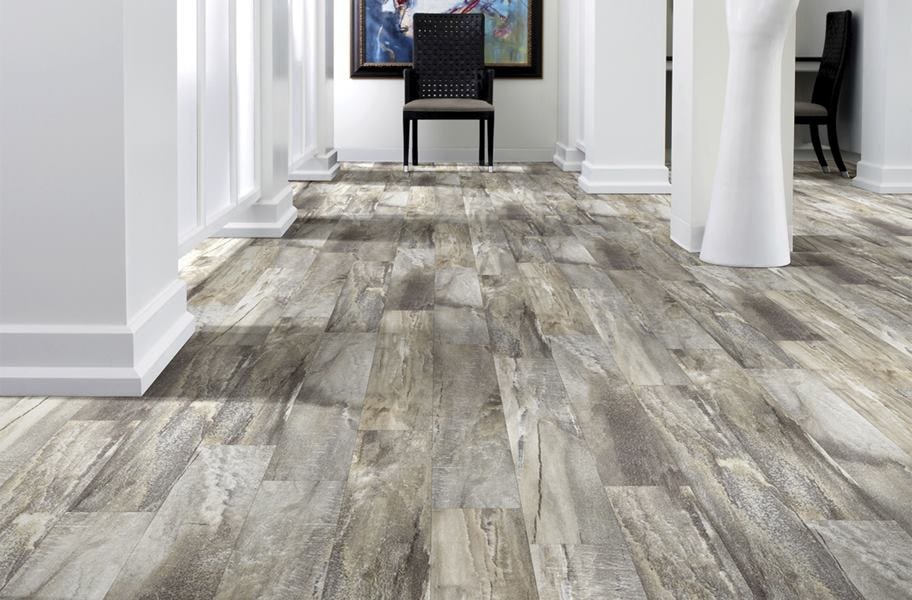
Most people get stone-look flooring in tile format, but as ceramic plank flooring becomes more popular, you’ll see more vinyl stone-look planks come into play.
Concrete, travertine, and slate are very popular when it comes to stone-look vinyl planks. Guess what? We have those looks too. Vinyl planks have a lot of those looks. From light beige travertine to a dark gray slate, we got your stone-looks covered.
Decorative Vinyl Planks
Sometimes a room’s style calls for something more than mimicking natural looks. That’s when decorative vinyl planks can shine, with geometric patterns, metallic accents, stain glass looks, and so much more.
No matter what your style is, there are plenty of unique, decorative vinyl plank options to fit your space.
| Related Content >> Vinyl Tile Flooring Buying Guide |
How to Install Vinyl Plank Flooring
Vinyl plank flooring has a ton of installation options. Every home is different and one installation might work better than other installation types. That’s why we carry vinyl planks with four main types of installation: interlocking, peel and stick, glue down, and loose lay.
Interlocking
Interlocking installation is similar to the tongue and groove installation you may have heard of. Vinyl planks are simply locked together to create a floating floor. The floor does not adhere to the subfloor, but the weight of the floor holds it in place.
You’ll find that most vinyl is interlocking. It’s super DIY friendly and requires only a few extra tools like a rubber mallet and a utility knife. Here’s a short video about the interlocking method of installation:
Glue Down
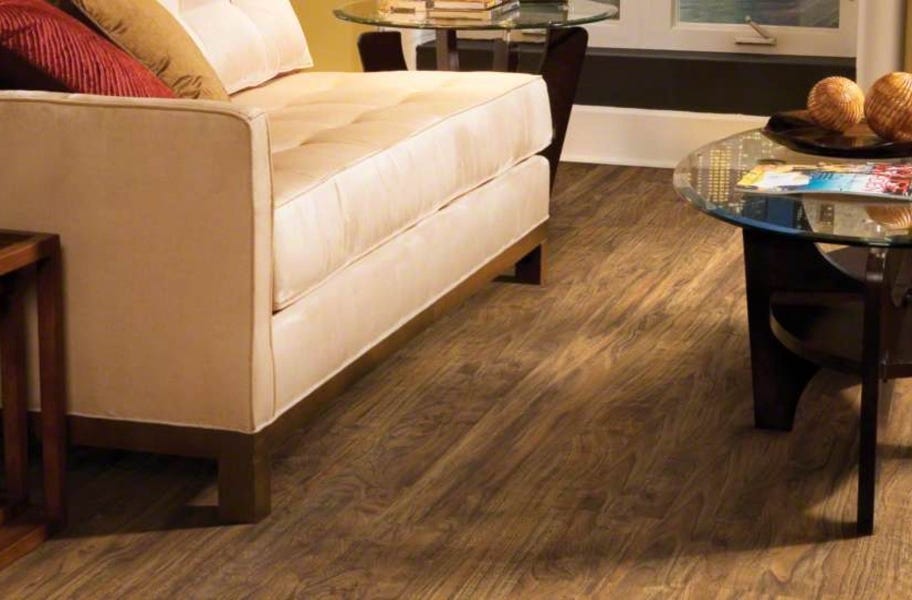
Permanent and high-traffic areas usually need flooring with a secure hold. That’s when the glue-down method comes in.
This installation method is a bit more involved, as it requires a pressure-sensitive adhesive. You glue vinyl planks down as you go. This ensures that each vinyl plank is fully bonded to the floor below it.
Loose Lay
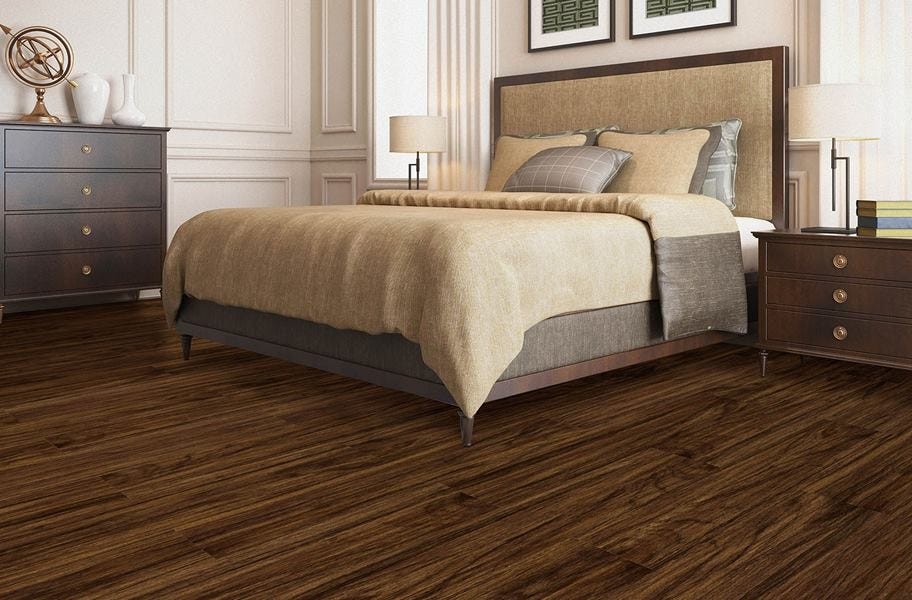
With loose lay vinyl planks, each plank has a backing that grips the subfloor and keeps it from moving. This means that you can simply lay down the planks and not use any glue to keep them in place. You can do this if the room will not be getting much traffic.
However, if your space is going to have a decent amount of traffic, it’s recommended you use double-sided carpet tape around the perimeter and undeath planks to keep any planks from shifting. If you want something more permanent, glue down the planks.
How to Clean Vinyl Plank Flooring
The good news is, vinyl flooring is virtually maintenance-free. It’s so easy to clean and take care of, you won’t dread doing chores.
To clean your vinyl floors, be sure to vacuum up any dust, dirt, or debris. It’s best to use a vacuum without a beater bar for this.
You can also use a damp mop to keep your vinyl flooring clean. Be sure to clean up any spills immediately to prevent damage to your flooring.
That’s all it takes for clean floors!
Vinyl Plank Flooring FAQ
Have some questions about LVP flooring? We’ve got answers! Check out our FAQ to get the facts.
How do you install vinyl plank floors?
Luxury vinyl planks are installed as floating floors using a tongue-and-groove design to easily snap planks together. Peel and stick planks can be installed as easily as removing the cover paper to reveal the adhesive, and then placing the plank. Both options are easy to DIY and save you money on installation costs.
Are luxury vinyl planks better than laminate?
Vinyl planks are more water-resistant than laminate and are therefore a better choice for a kitchen or basement floor. Though it looks similar to laminate, vinyl is built differently to be water-resistant, and even waterproof, with WPC/SPC cores. Laminate, however, is less expensive than luxury vinyl. Both floors come in several looks and colors, are easy to clean, and are extremely durable.
Are vinyl planks waterproof flooring?
Vinyl flooring, in general, is water-resistant. New technologies and developments have allowed manufacturers to create new and improved vinyl flooring which is denser, less likely to expand and contract, and has a higher resistance to water/moisture than ever before. This miracle flooring is known as WPC/SPC vinyl flooring. If you plan to place luxury vinyl tile or plank flooring in a laundry room, bathroom, or other water-prone areas, you’ll want one of these options.
Do you need underlayment for vinyl plank floors?
Some luxury vinyl floor planks will come with an underlayment attached. If your product does not come with an attached underlayment, we recommend purchasing one. Underlayment has sound-dampening properties, protects your subfloor and flooring, and makes your vinyl flooring softer underfoot. Cork and foam are popular underlayment choices for vinyl planks.
| Related Content >> Vinyl Flooring FAQ |
Conclusion
By now, you probably have a good idea about what type of vinyl floor planks you’ll want for your space. Though, with so many options to choose from, it’s probably hard to pick just one!
Ready to shop?



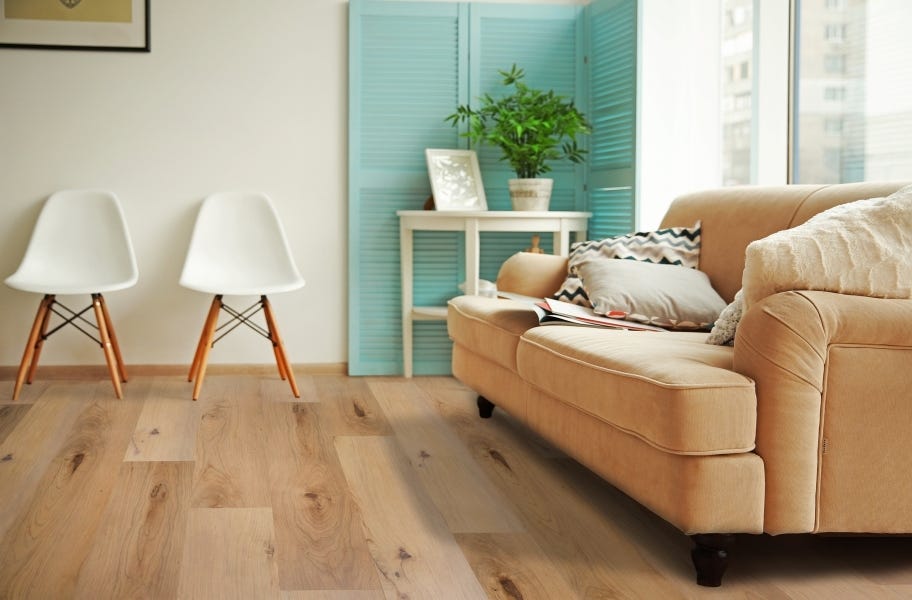
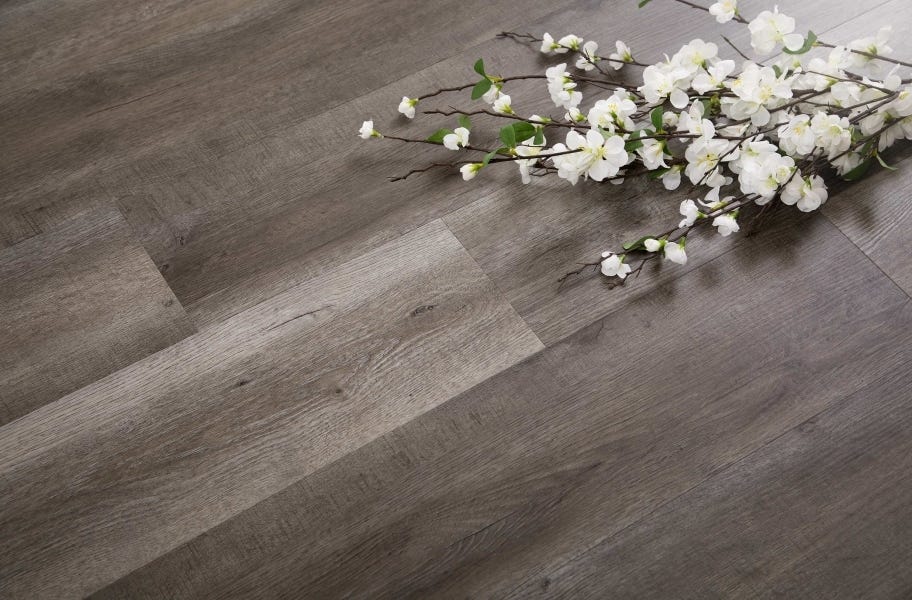
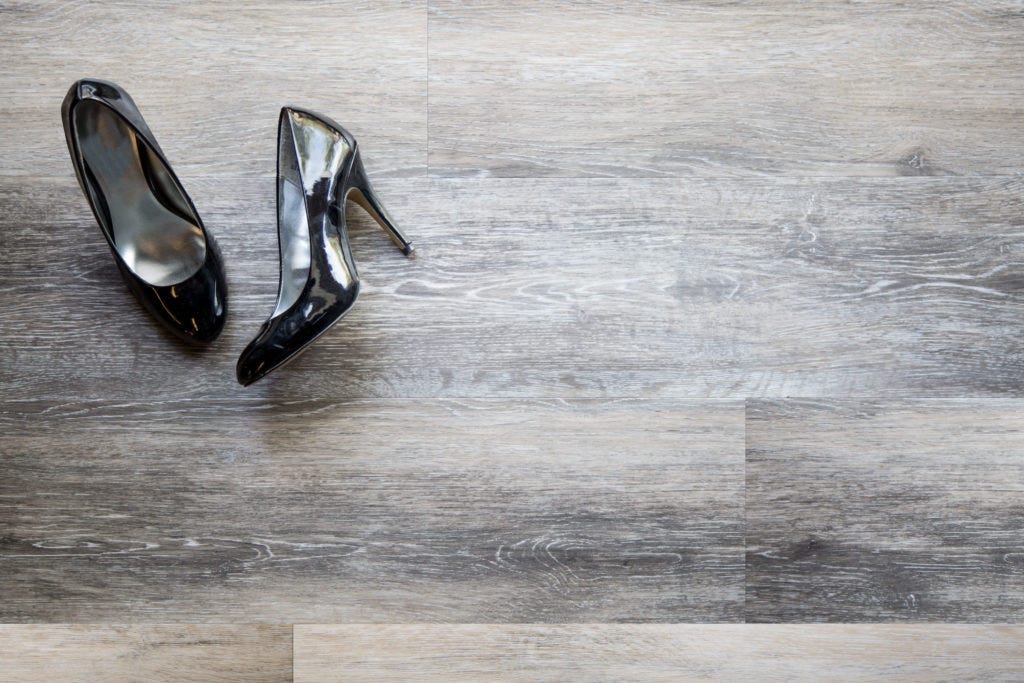
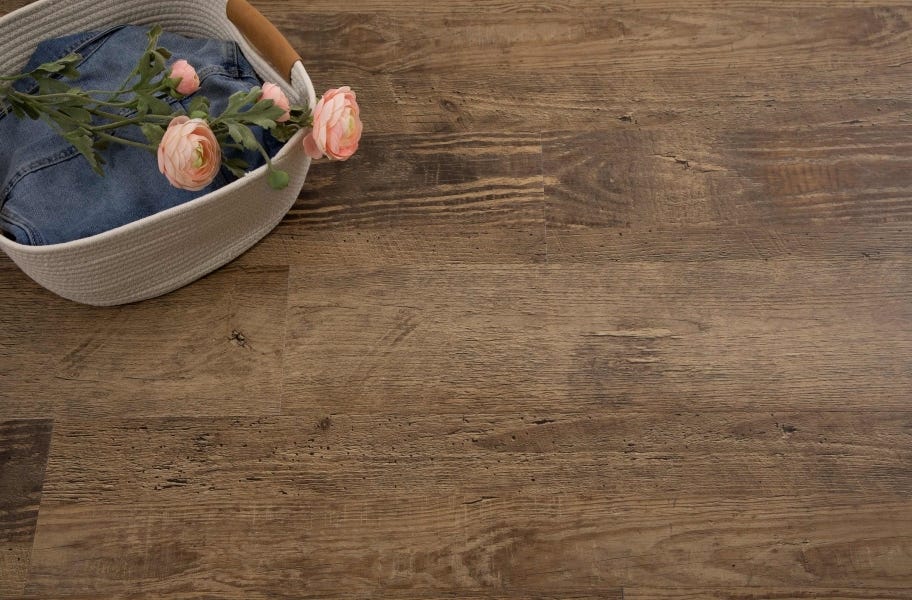


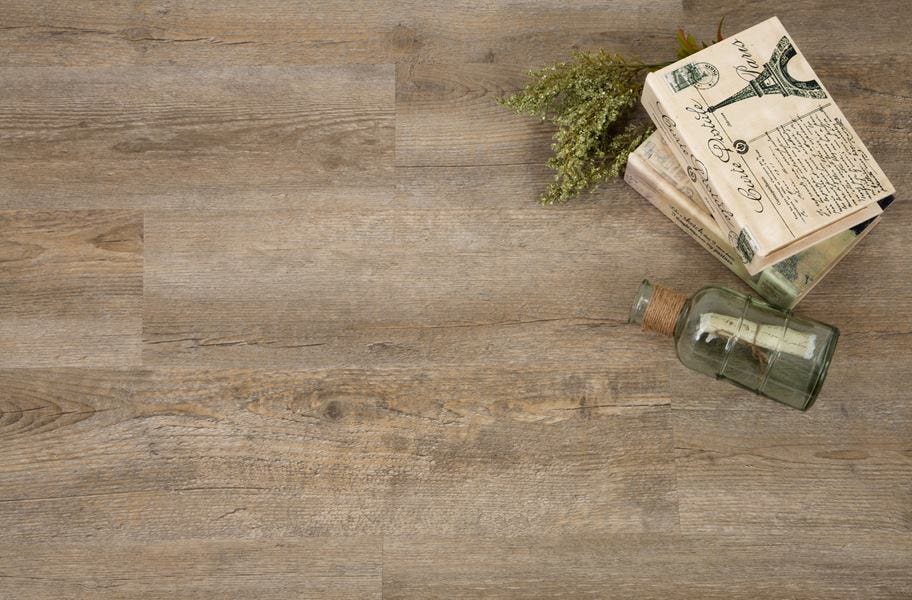
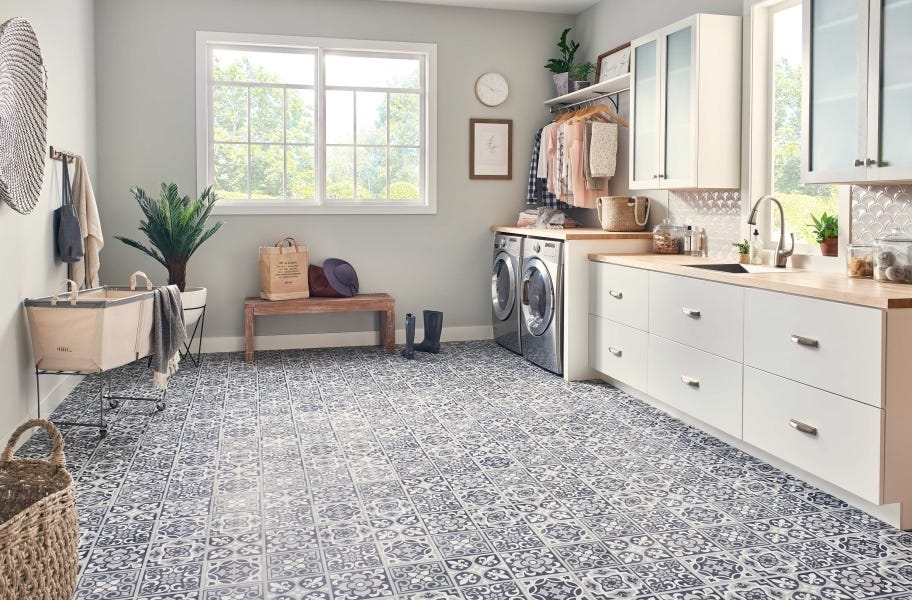
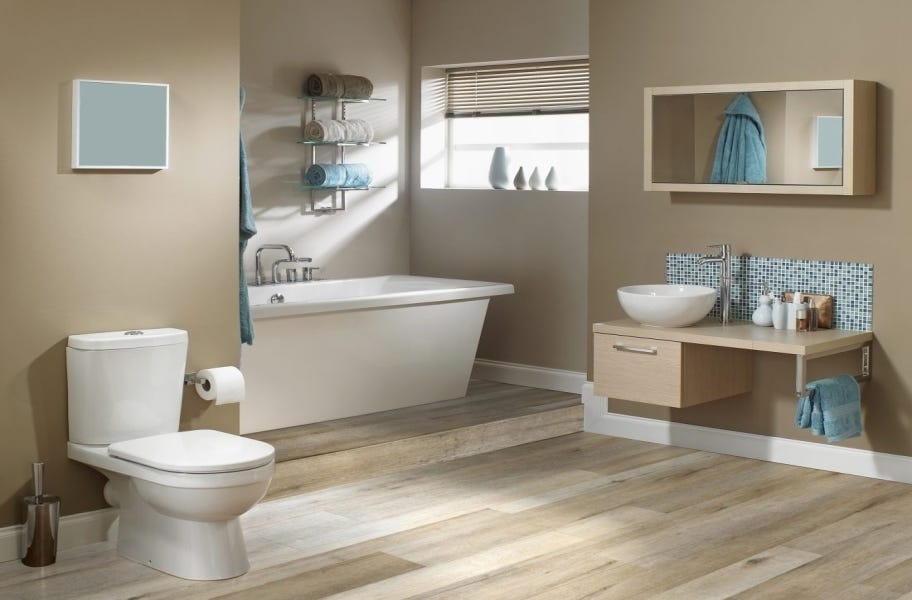

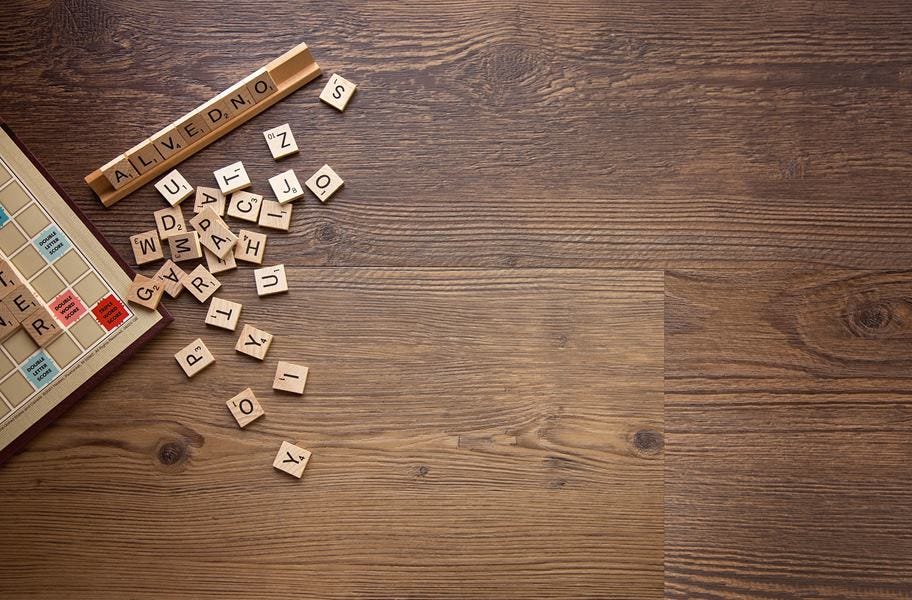

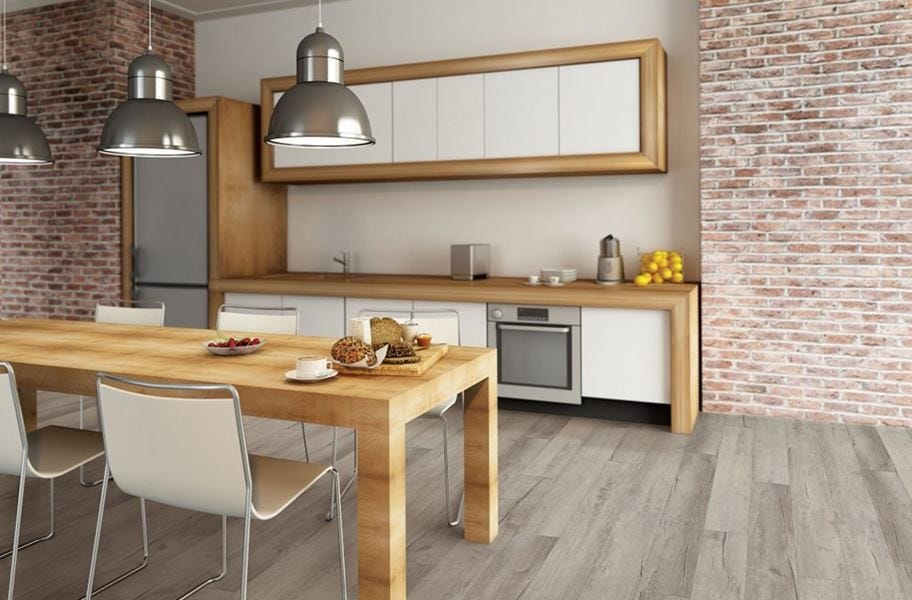
Great question! Planks may be cut with a utility knife using the “score and snap” technique, or with the use of a crosscut power saw. Installation is commonly done by our customers using one of the methods described above - interlocking, peel and stick, glue down, and loose lay.
Great question! A urethane-coated wear layer is a great standard for a durable finish, and ceramic bead coating is basically the next level up in protecting your <a href="https://www.flooringinc.com/vinyl/planks.html?utm_source=blog&utm_medium=comment&utm_campaign=Whats%20the%20Deal%20with%20Vinyl%20Planks%20Part%201" target="_blank" rel="noopener nofollow">vinyl floor</a>. Ceramic bead coating is essentially a urethane coating with microscopic beads of ceramic that provide an extra layer of protection as well as anti-slip properties. While a urethane-coated wear layer on its own is durable and stain-resistant, wear layers with ceramic bead in the coating provide outstanding resistance to scratching and are known for being far more durable than flooring with a urethane layer alone.
Bottom line, both are great! But ceramic bead has the edge.
Hope that helps!
Absolutely! Not just any vinyl planks, but high-quality, luxury vinyl planks? You betcha. My personal choice would be WPC vinyl because it's the best of the best.
We do not recommend gluing vinyl planks onto carpet. If you're unable to remove the carpet before installation, you can try a <a href="https://www.flooringinc.com/vinyl/planks.html#!filter=1281" target="_blank" rel="nofollow">loose lay</a> or "floating" vinyl plank flooring instead, as long as the carpet is flat and not plush.
Thanks for reading!
Ari